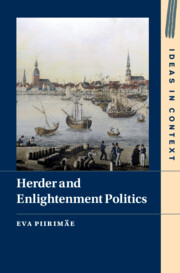Book contents
- Herder and Enlightenment Politics
- Ideas in Context
- Herder and Enlightenment Politics
- Copyright page
- Contents
- Preface
- Acknowledgements
- Note on Translations
- Abbreviations
- Introduction
- Chapter 1 Republics, Monarchies and the Philosophy of Human Society
- Chapter 2 Rousseau and the Origins of the ‘Current Malaise of the World’
- Chapter 3 Montesquieu’s System and Reforms in Russia
- Chapter 4 The Bildung of Humanity and Modern Virtue
- Chapter 5 German Freedom and Modern Liberty
- Chapter 6 The Vocation of Poets, Pastors and Philosophers
- Chapter 7 State-Machines, Commerce and the Progress of Humanität in Europe
- Chapter 8 Perpetual Peace and Purified Patriotism
- Conclusion
- Epilogue
- Bibliography
- Index
Chapter 8 - Perpetual Peace and Purified Patriotism
Published online by Cambridge University Press: 30 March 2023
- Herder and Enlightenment Politics
- Ideas in Context
- Herder and Enlightenment Politics
- Copyright page
- Contents
- Preface
- Acknowledgements
- Note on Translations
- Abbreviations
- Introduction
- Chapter 1 Republics, Monarchies and the Philosophy of Human Society
- Chapter 2 Rousseau and the Origins of the ‘Current Malaise of the World’
- Chapter 3 Montesquieu’s System and Reforms in Russia
- Chapter 4 The Bildung of Humanity and Modern Virtue
- Chapter 5 German Freedom and Modern Liberty
- Chapter 6 The Vocation of Poets, Pastors and Philosophers
- Chapter 7 State-Machines, Commerce and the Progress of Humanität in Europe
- Chapter 8 Perpetual Peace and Purified Patriotism
- Conclusion
- Epilogue
- Bibliography
- Index
Summary
This chapter discusses Herder’s engagement with the French Revolution and his continuing debate with Kant, specifying the ways in which Herder sought to balance humanitarian and patriotic concerns in his political vision in the 1790s and early 1800s. Herder celebrated the French Revolution as an attempt to restore a ‘living constitution’ based on natural order in France. He initially also welcomed Kant’s ideas on human dignity, but soon came to reject his more specific conception of self-determination. His worries about the outbreak of the Revolutionary wars were reflected in his concern that Kant’s philosophy of history might unwittingly exacerbate republican moral absolutism and imperialism. In his view, Kant could not adequately resolve the gap between professed principles and action, law and ethics. Herder’s own understanding of a truly humanitarian philosophy of history was grounded in his Stoic-vitalist account of human self-determination. He further elaborated on the ways in which humans could cultivate their ‘sensus humanitatis’ through reflective engagement with history, criticising various instances of European colonial imperialism. His primary concern, however, was to guide European nations—above all, the German—in cultivating a new ethic to enable the simultaneous pursuit of domestic reforms and international cooperation.
Keywords
- Type
- Chapter
- Information
- Herder and Enlightenment Politics , pp. 276 - 323Publisher: Cambridge University PressPrint publication year: 2023



